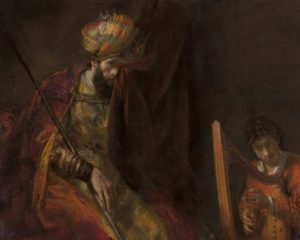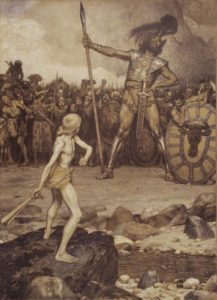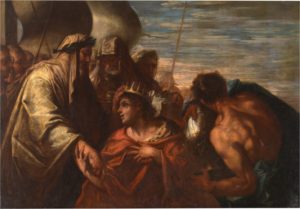Scripture presents David as a man of passionate character, brave and daring, with unwavering loyalty to King Saul, the Lord’s Anointed, despite the trials he had to endure. This rich human personality is inseparable from his exceptional religious sentiment: his magnanimity towards enemies, his personal sense of sin and penance, his submission to God, and his resistance to pressure Him.

Saul and David, Rembrandt
David is portrayed as the ideal monarch. However, unlike the monarchies of neighboring peoples, in Israel and Judah, the king is not deified. On the contrary, David is a profoundly human character, with noble feelings and passions, which are clearly and simply depicted in the books of Samuel. Among these stand out his trust in God and the example of his repentance.
He faces combat with Goliath with no more weapons than his shepherd’s gear because he trusts that God will not allow his enemies to triumph over His people. He relinquishes his personal plans to build the Temple, which in the customs of the time meant renouncing the means to establish a dynasty. Instead, Nathan’s oracle provides him with a new perspective: “Moreover, the LORD also declares to you that the LORD will make a house for you. When your days have been completed and you rest with your ancestors, I will raise up your offspring after you, sprung from your loins, and I will establish his kingdom. He it is who shall build a house for my name, and I will establish his royal throne forever.” (2S 7,11-13).

David and Goliath by Osmar Schindler
Following this commitment, David trusts that the Lord will fulfill His promise. This generous surrender into God’s hands allows him to accept his mistakes and simply acknowledge his sin when, later on, Nathan leads him to reflect on his fault and deeply experience repentance.
The Lord definitively commits to the Davidic dynasty in a gratuitous and unconditional way, through a promise that God will not retract regardless of what may happen in the future, and independently of how David’s descendants behave.
Centuries later, the Babylonian exile prompted a reflection on the political failure of the Davidic monarchy and the true meaning of Nathan’s prophecy.
Finally, the coming of Jesus fully revealed the profound values of those prophetic words: God had not promised the eternal maintenance of a temporal kingdom, but the advent of a kingdom of a peculiar nature that would fall to a descendant of David according to the flesh, Jesus Christ.
Jesus announces the kingdom of God and inaugurates it in a mysterious way. However, to prevent the fundamentally spiritual reality of his reign from being misunderstood, he discreetly avoids making ostentatious displays of his royalty, although on occasions he accepts being greeted as “son of David” (Mc 10,47-48) and makes a notable exception to this manner of proceeding during his triumphal entry into Jerusalem, precisely a few days before his death. After his resurrection, and with the image of his kingdom sufficiently purified, the disciples did not hesitate to highlight his Davidic lineage (Mt 1,1) and the fulfillment in him of Nathan’s prophecy (Acts 2,30 y Heb 1,5).

King David crowned, Museo del Prado
The figure of David was extensively used in Christian preaching during the apostolic age. Many Church Fathers equate the semblance of David to the image of a Christian, especially when presenting his victory over Goliath as the conquering of difficulties and the power of evil while relying on the support of grace.
But, above all, David is the king of Israel who announces Jesus Christ, the universal King.
By don Francisco Varo, priest
